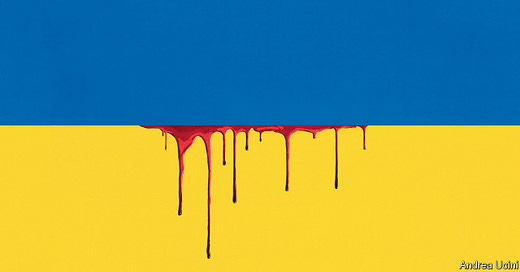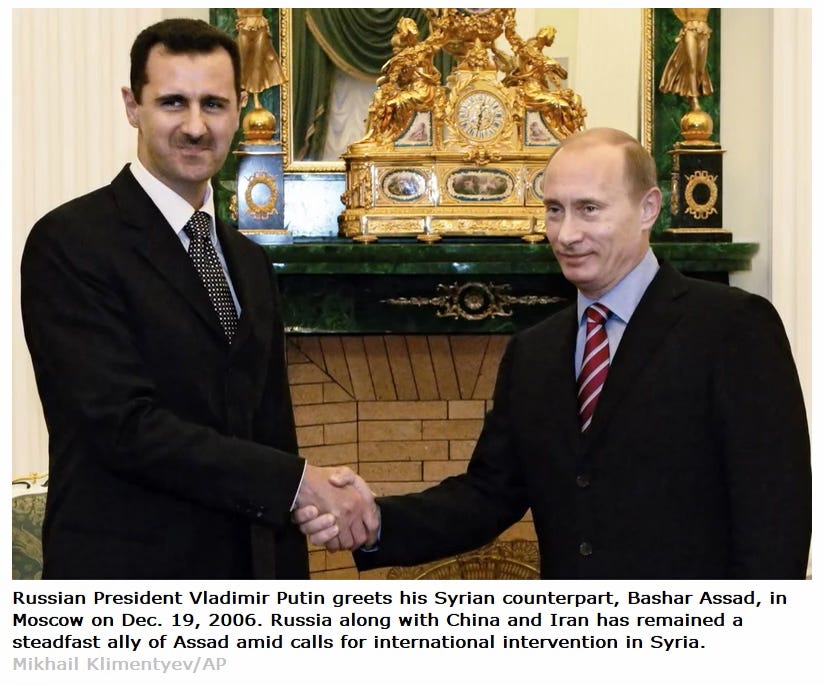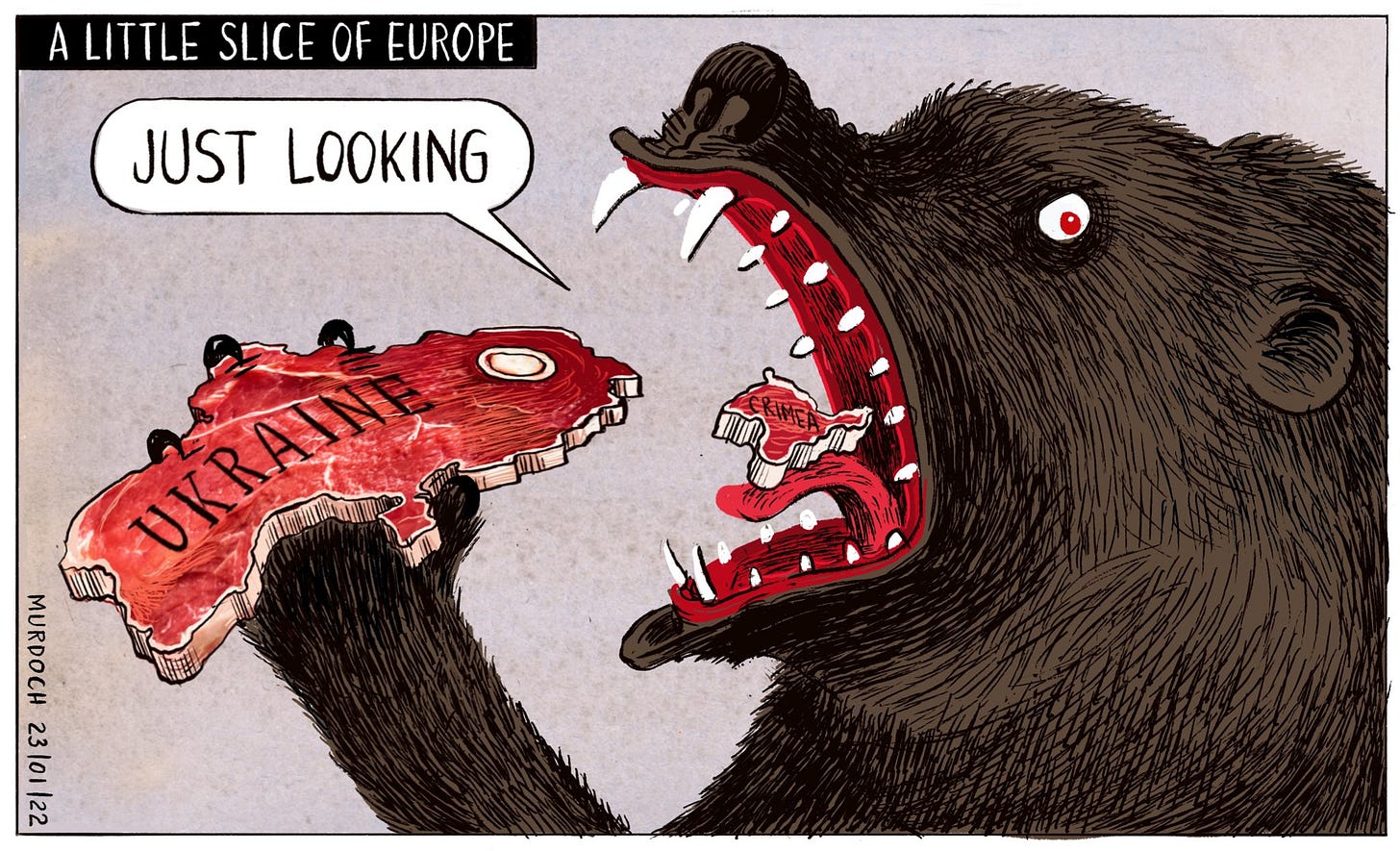Ukraine: what are we are missing? (3/toru)
Historical Flights of Fantasy...
Far Right/conservatives in the West have enthusiastically supported Putin's imperial ambitions and the invasion of Ukraine. For the Far Right, Putin's conservatism is a bulwark against the "woke liberalism" of the "decadent West".
Leftwing commentators have also supported Putin's naked aggression for reasons that are often less than clear. For some commentators, Russia's aggression is blamed on NATO's expansionism into former Soviet republics and satellite states in Eastern Europe. This belief is often stated (and repeated by lazy mainstream media who have failed to take note of nuanced European events) despite German Chancellor Olaf Scholz reportedly stating on 14 February:
“The question of [Ukrainian] membership in alliances is practically not on the agenda...That something that is not even on the agenda is being made an issue.”
For others on the Left, there are still fond memories and habitual allegiance to a Soviet Union that no longer exists except in countless history books lining long lengths of library shelves.
Yet other leftwing commentators have correctly pointed out the naked hypocrisy of the West condemning Russian aggression and its war crimes in Ukraine - whilst turning their back on the ongoing repression suffered by Palestinians in Gaza and the West Bank for decades.
Whichever rationale is proferred for oft-muted criticism of Putin's mad adventurism - or sometimes outright support - the most bankrupt suggestion that Ukraine is historically "part of Greater Russia" is perhaps the most offensive. And the least valid.
Expecting Ukraine to be little more than a province or satrap of a Greater Novorossiya would be akin to England having suzerainty over Ireland (and denying further opportunities for Scotland to choose independence in the future).
Another prime example is Poland and Hungary which have enjoyed a close relationship and fraternal bond for centuries. On two occassions (1370 to 1382 and 1440 to 1444) both nations shared a King to rule over them. Yet, there would be no conceivable scenario in which either Poland or Hungary might justify invading the other for bizarre notions of being an "inalienable part of our own history, culture and spiritual space" - a claim Putin has made regarding Ukraine on 21 February this year, only three days before Russian forces invaded sovereign Ukraine.
Whatever common roots both Russia and Ukraine share are lost in the mists of time. Both nations now have their own culture; their own language; their own identity.
To be tempted to validate Russia's weak territorial claim would give rise to justifications for other nations to war with each other if, somewhere in the dim past, they shared some measure of commonality.
... and Spheres of Influence. Ukraine? Venezquela? Cuba?
The very suggestion that Ukraine capitulate to Moscow's demand that it abandon it's independent foreign policies; to "de-militarise" (code for surrendering it's armed forces to the Russian Army); and give prominence to the Russian language would mean absorption into a Greater Russian Empire at worst - or neutered satrapy at best, ruled through a puppet regime installed from Moscow.
It would give credence to the Cold War doctrine of recognised "Spheres of Influence".
It was under this doctrine that the former Soviet Union held sway over Eastern Europe, North Korea, South East Asia, some parts of Africa, and Cuba. Meanwhile the Western Sphere of Influence encompassed Western Europe, most of Latin America, the Pacific, and parts of Africa and the Middle East. Other areas within these geographical zones remained "contested" - pawns in a super-power, real-life, deadly "Game of Thrones".
Under this doctrine, the USSR was able to crush uprisings in Hungary, Poland, and Czechoslovakia. The United States was able to topple governments in Latin America, Middle East South East Asia, and attempted to topple Fidel Castro's revolutionary government.
Governments throughout Africa, Asia, and the Middle East were undermined and overthrown, replaced with pro-Western or pro-Soviet regimes.
Perhaps the two most notorious examples of Western meddling in other nation's affairs culminating in coup d'états toppling legitimate governments occurred in Iran in 1953 with the over-throw of Mohammad Mosaddegh and in Chile with the over-throw of Salvador Allende in 1973. Both governments had been democratically elected. In both cases the elected lewadership was replaced by dictators.
Not all "regime change" were done for noble purposes to "build democracy". (Or "build socialism" in former Soviet bloc nations.)
If, however, as some have flirted dangerously with the suggestion that Ukraine is part of a new "Sphere of Influence" for Russia - then this takes us perilously further down the road to Cold War II.
A "Sphere of Influence" for Russia demands a Western equivalent. It means American economic sanctions against Cuba are legitimised. It means that Western attempts to undermine the Maduro government Venezuela are justified and support for pro-Western, regimes throughout Asia, Middle East, and Africa are justified. No matter how odious their human rights records might be.
"Spheres of Influence" can only have only result; international conflict and de-stabilisation of governments as the West, Russia, and China vie for ascendancy.
If Ukraine cannot be allowed self-determination, then what hope for Cuba?
Nuclear disarmament - Where to from Ukraine?
As the former USSR disintergrated in 1991 from a unified entity into separate, independent states - with the Russian Federation being the largest - there remained the un-nerving problem of atomic weapons scattered throughout former Soviet Republics. For a brief, frightening moment in history, Ukraine, Kazakhstan, and Belarus became nuclear powers.
After negotiations and vague guarantees of security, Ukraine surrendered it's stockpile of atomic weapons and related material to the Russian Federation. Demands from Ukraine for strict assurances of its territorial integrity and protection from aggression were not as fulsomely guaranteed as Ukrainians expected.
In 1994, Ukraine, Russia, United States, and UK signed the "Memorandum on security assurances in connection with Ukraine’s accession to the Treaty on the Non-Proliferation of Nuclear Weapons" - aka the "Budapest Memorandum".
Then-US Secretary of State, James Baker, was of the firm view that Russia must inherit the former Soviet Union's atomic weapons, wary that former Soviet republics become “Yugoslavia with nukes.”
Despite luke-warm security assurances, and with mounting international pressure, the "Budapest Memorandum" was signed on 5 December 1994. Ukraine, Kazakhstan, and Belarus dis-armed.
Those three former Soviet Republics - along with South Africa - became the only four nations ever to surrender their stockpile of atomic weapons. They would most likely be the last, as events twenty year later unfolded.
In 2014, Russia breached it's non-aggression agreements with Ukraine and invaded Crimea.
In 2022, Russia launched a full-scale invasion that has killed thousands on both sides; displaced millions of refugees; and levelled cities.
Ukraine must be ruing the day it voluntarily surrendered it's atomic arsenal.
The significance of this cannot be over-stated, as Aldo Zammit Borda from the University of London clearly explained:
It is unsurprising, perhaps, that some Ukrainian leaders and the public feel betrayed and consider that the security assurances they received in the Budapest Memorandum are not worth the paper they were written on.
This may have far-reaching consequences for the future of nuclear nonproliferation and disarmament. Other states in Russia’s neighbourhood – and in the wider world – may begin to question whether such assurances are sufficiently reliable to ensure their long-term security. This may, in turn, undermine the credibility of major power security assurances, previously used as bargaining chips to dissuade countries such as Belarus, Kazakhstan and Ukraine from possessing nuclear weapons.
This experience may also change the rhetoric around nuclear nonproliferation that, at present, casts states seeking nuclear weapons as “international pariahs”. In light of Ukraine’s experience, the pursuance of nuclear weapons to safeguard one’s sovereignty and independence may be seen as more legitimate.
The far-ranging consequences of Russia's invasion of Ukraine are that nations that possess atomic weapons will never surrender them. Others may be thinking very strongely about joining the "nuclear club".
Former Japan Prime Minister, Shinzo Abe, recently suggested that his country abandon it's nuclear-free zone status and consider “nuclear-sharing”:
“Japan is a signatory to the Nuclear Non-Proliferation Treaty and has its three non-nuclear principles, but it should not treat as a taboo discussions on the reality of how the world is kept safe... Japan should also consider various options in its discussions.”
And a few weeks ago, North Korea apparently began re-building Punggye-ri nuclear testing site which has been de-commissioned and parts demolished with explosives in 2018.
Ukrainian's vulnerability, and the West's inability to enforce security guarantees made in 1994, have made the entire world a much more dangerous place.
As Russia invaded Ukraine on 24 February, the dream of nuclear disarmament receded to Neverneverland. Instead, the nuclear club may soon busy itself printing new invitations for membership.
The Middle East Connection
Recent reports claim that Russia may be drawing on mercenaries from Syria and Chechnya. The latter is one of several republics within the Russian Federation.
The former - Syria - is one of Putin's staunchest allies, and relied heavily on Russian military power to turn the tide in it's eleven-year long civil war:
Now pay attention, because this gets complicated and messy: Syria is Russia's ally and will send (has sent?) mercenaries to assist Putin's invasion of Ukraine. Iran is an ally to Syria and Russia. Israel considers Iran an enemy and has engaged in hostile activity with the Islamic state, as well as other hostilities in Syria, against targets including Iran-backed militias, such as Lebanon’s Hezbollah . Israel is working "in co-ordination" with Russia within Syria; Syria is Russia's ally. Full circle.
To understand the complexities of intertwined, conflicting, and shifting sands of allegiances, the following diagramme was conveniently drawn up by senior fellow and the Director of the Syria and Countering Terrorism & Extremism programs at the Middle East Institute, Charles Lister and shared on Twitter:
One would think Putin would have his hands full keeping careful track of his involvement in the Middle East without adding Ukraine to his list of adventures.
(To be concluded: Part 4/wha – The Big Question and Unhappy Generals)
.
References
Al Jazeera: How US right-wing views Putin amid Russian war on Ukraine
The Conversation: Putin’s antagonism toward Ukraine was never just about NATO – it’s about creating a new Russian empire
Redline: Western media blinkers and moving geopolitics
Bowalley Road: The West Will Ignore Putin’s Weary Anger At Its Peril.
The Daily Blog: The weapon of choice when you have no firearms
Politico: Scholz, Zelenskiy play down talk of NATO membership for Ukraine
Wikipedia: Novorossiya (confederation)
Wikipedia: Hungary–Poland relations
Kremlin.ru: Address by the President of the Russian Federation
BBC: Ukraine conflict – Putin lays out his demands in Turkish phone call
Wikipedia: 1953 Iranian coup d'état
Wikipedia: Mohammad Mosaddegh
Wikipedia: Salvador Allende
Wikipedia: 1973 Chilean coup d'état
Wikipedia: Dissolution of the Soviet Union
The Wilson Centre: The Breach: Ukraine’s Territorial Integrity and the Budapest Memorandum
The Atlantic: Why One President Gave Up His Country's Nukes
The Conversation: Ukraine war - what is the Budapest Memorandum and why has Russia’s invasion torn it up?
The Japan Times: Japan should consider hosting U.S. nuclear weapons, Abe says
BBC: North Korea - Construction spotted at Punggye-ri nuclear test site
The Intercept: Russia’s Newest Weapon in Ukraine May Be Mercenaries Linked to Putin
Al Jazeera: Chechen leader, a Putin ally, says his forces deployed to Ukraine
Wikipedia: Chechnya
Wikipedia: Syrian Civil War
NPR: Who Are Syria's Friends And Why Are They Supporting Assad?
ABC News: Syria - 2 civilians killed in Israeli airstrike near Damascus
Axios: Israel-Russia coordination in Syria unaffected by war in Ukraine
Middle East Institute: Charles Lister
Twitter: @Charles_Lister - Syrian civil war - combatants - 14 Feb 2016
Other Blogs
Werewolf: Gordon Campbell on how, and whether the Ukraine war might end
Additional
The Observer: The western elite is preventing us from going after the assets of Russia’s hyper-rich - Thomas Piketty
France24: Russia receives Venezuela's 'strong support'
Newsnation: Cuba among very few supporters of Putin’s attack on Ukraine
Atlantic Council: As the world shuns Russia over its invasion of Ukraine, Iran strengthens its ties with Moscow
Foreign Policy: In Backing Russia on Ukraine, Iran Is on the Wrong Side of History
Middle East Institute: Syria’s role in Putin’s invasion of Ukraine
Miami Herald: As many Cubans oppose the war, Ukraine rebukes the island government’s support of Russia
Middle East Institute: Syria’s role in Putin’s invasion of Ukraine
Previous related blogposts
A FTA deal with Russia?! That’s a big “NYET” Comrade Key!
Google takes a subtle (?) swipe at Russian homophobia
The Sweet’n’Sour Deliciousness of Irony: Russia accused of meddling in US Election
Protestors condemn Russian involvement in atrocities in Aleppo
The Ukraine Invasion: Putin's Big Gamble
Ukraine: what are we are missing? (1/tahi)
Ukraine: what are we are missing? (2/rua)
.
Acknowledgement: Sharon Murdoch
.
Liked what you read? Feel free to share.
Have your own thoughts? Leave a comment. (Trolls need not bother.)







